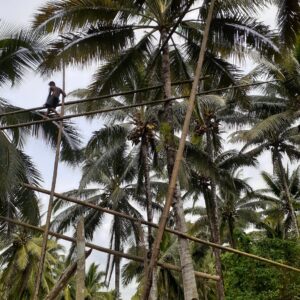
“Pangarap na talaga (namin) na lumikha ng sariling pagkain. (We have long dreamed of producing our own food.)” said Rodrigo “Digo” Belleza, leader of the Malaya Farmers Agriculture Cooperative (MFAC). Kuya Digo was referring to the small scale miners’ dream of shifting from mining to sustainable agriculture. The establishment of the MFAC and their purchase of 50 hectares of land signifies the beginning of the realization of this dream.
It all started in 2016 when the small scale miners in Barangay Malaya, Labo, Camarines Norte (south of Luzon) were formally organized as the Malaya Mining Agriculture Association (MAGKAMATAO). The organization is recognized by the local government of Labo, Camarines Norte, and the Department of Labor and Employment (DOLE). MAGKAMATAO practiced responsible mining through their partnership with the International Labor Organization and Ban Toxics. Responsible mining entails prioritizing the safety of miners and the community, taking care of the environment by not using mercury in processing ores, and establishing alternative sources of income aside from mining. For a year between 2017 and 2018, MAGKAMATAO voluntarily stopped its mining operations in adherence to the mining policies of the Department of Environment and Natural Resources (DENR). In 2018, Barangay Malaya, through MAGKAMATAO, was awarded a license to operate a Minahang Bayan (people’s mine) which designates areas where artisanal or small-scale miners can mine. It is the only community in the municipality of Labo to be awarded this license.
Given that mining as a major source of livelihood has proven to be unsustainable, MAGKAMATO, in 2017, decided to purchase 50 hectares of land for farming from their organization’s savings, pushed by their desire to produce their own food, lessen the cost of their mining operations, and have an alternative source of livelihood because they also recognize that mining will only last for less than 10 years in their area.
Through the organization’s linkages with the municipal government of Labo, the MAGKAMATAO leaders were introduced to the Federation of Coco Farmers and Farm Workers Association (FECOFFWA, a national farmer organization). The partnership of MAGKAMATAO and FECOFFWA with the assistance of AFOSP-MTCP2 facilitated the creation of the MFAC in 2018. MAGKAMATAO is now solely focused on mining operations while MFAC is focused on managing the 50-hectare organic farm. The cooperative currently has 165 members.
FECOFFWA and the AFOSP-MTCP2 were instrumental in creating a land-use plan for the MFAC’s farmland. Currently, 9.5 hectares are used for farming, including 1.5 hectares for coco sugar production. Aside from having a land-use plan, FECOFFWA and AFOSP-MTCP2 also contributed to several capacity building sessions on cooperative formation and management, including training courses on finance management, leadership, integrated diversified organic farming, and developing the value chain of coconut. MFAC is primarily producing coco sugar and coco vinegar aside from organic vegetables. The farm has 147 trees and can produce 300 kilograms of coconut sugar in a month and up to 2,000 kilograms in three months depending on the season. FECOFFWA was also able to facilitate the learning of local farmer organizations from each other. A local organization from another province conducted the training for coco sugar production for MFAC.
The cooperative also has sectoral formations: a women’s organization and a group of young farmers. The women’s organization, composed of 20 women, are in charge of coco sugar production and other coconut value chain products including vinegar, coconut sap juice, virgin coconut oil, and dishes using coconut meat. The 35 young farmers are considered as the second liners for the organization. They are actively engaged in helping on the farm and were given a portion of the land to farm and apply what they learned from the farm technicians.
Leaders and members of MFAC were also assisted in terms of developing proposals for government agencies that they were able to establish linkages with through FECOFFWA and other AFOSP-MTCP2 engagements. Through these proposals, the cooperative received equipment and training from the Philippine Coconut Authority for coco sugar production and solar water pump and greenhouse from the Department of Agriculture (DA).
The municipality of Labo also recognizes the MFAC through its active participation in the Barangay and Municipal Development Councils and the Municipal Cooperative Development Council (MCDC). The MCDC has declared MFAC as part of the municipality’s agritourism. Through its involvement in these formations, MFAC has pushed for legislation supporting organic local products including coco sugar and other organically grown vegetables, and the involvement of young farmers in sustainable agriculture. They have also requested the municipal government for construction of farm to market roads.
Both MFAC and MAGKAMATAO have significantly contributed to their local community through the practice of responsible mining, providing opportunities for work and additional income for both men and women, production of organic vegetables that are sold to the community, rehabilitation of abandoned mines, and construction of roads and classrooms for the local high school, and tree planting in crucial areas in the community. The two organizations have plans of expanding their membership, further developing their farmland in more sustainable ways, setting up a farm school for the young farmers, and expanding their markets for coco sugar.

Comments are closed